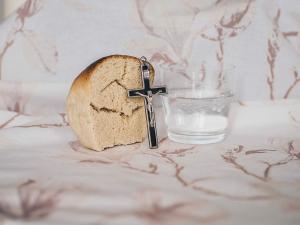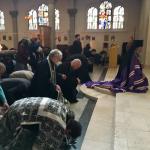
Our spiritual struggle, our fight against our worst instincts and inclinations, cannot and will not be overcome by giving into them. Nor will they be overcome by mere appearances of holiness. We can try to look holy in front of others, doing various pious deeds, but for piety to be effective, it must be real and not done for show. Even then, we must not assume piety is enough. We need grace. We need to embrace the grace which is given to us. If we rely upon mere externals without allowing our inner psyche be transformed and made better, then, no matter how holy we might appear to others, the reality is we are far from holy, and eventually, the darkness which remains within will reveal itself, as Abba Poemen understood and explained to his disciples:
Abba Poemen heard of someone who had gone all week without eating and then lost his temper. The old man said, ‘He could do without food for six days, but he could not cast out anger.’ [1]
What is the point of fasting? Why do we fast? It is to put on a show? Then we might as well not fast, for such a fast will not do us any good. Fasting is a tool, a means and not an ends in and of itself. It should be used to help us get to know ourselves better. We learn how to assert out will over our body, and in doing so, we find a way to assert that will against inordinate passions such as anger, pride, or vainglory. We will be able to follow what we know reason suggests is best instead of being moved willy-nilly by our desires, not, of course, in total denial of those desires, but in a way to let them work in harmony with each other and the various goods which we would otherwise ignore if we only focused upon them. If we forget the point of fasting, far from helping us learn how to gain such control over ourselves, we might use it to appease some of the worst aspects of ourselves, like our vainglory, allowing us to become more, not less, controlled by our worst inclinations. Thus, the faster mentioned by Poemen became consumed by anger because his focus was on food and not his own spiritual development
Fasting is not, in and of itself, what is important; if we think it is, then we might embrace a severe fasting regimen, appear to be great spiritual athletes to others, while remaining dead inside. We must use fasting as a tool to help us look inside ourselves, to see what inordinate passions we have within, and then fight against those passions instead of focusing on the fast itself. We must drive them out, realizing the power they have over us until we do. We can’t assume they will vanish merely because we have stopped eating food. They won’t. Indeed, if we are not careful, we will not gain control over hunger either, and so our thoughts during the fast will be about what we will eat once the fast is over, encouraging us to become gluttons and eat to our heart’s content once we are done with the fast. Instead of gaining control over gluttony and the desires it brings us, we only let it build up and fester in us, showing it was always in control, even when we were not eating. This is why it is important not to turn the fast into a show. Jesus, of course, told us this:
And when you fast, do not look dismal, like the hypocrites, for they disfigure their faces that their fasting may be seen by men. Truly, I say to you, they have received their reward. But when you fast, anoint your head and wash your face, that your fasting may not be seen by men but by your Father who is in secret; and your Father who sees in secret will reward you (Matt. 6:16-18 RSV).
If others know we have been fasting for days because we put on a show, telling them what we have been doing, we will receive whatever little reward we wanted from our actions. Our fast was not for the sake of spiritual transformation, but rather, for the sake of appearances and the praises those appearances might bring to us. If we engage our fast without telling others, if we hide it from them, we will then find ourselves fighting, not only hunger, but vainglory, and through that fight, we also will begin our fight against other deadly sins, like sloth and pride. Lust, itself, is often seen fought by fasting, but only because lust is like hunger, related to bodily passions and desires, desires which can be good when used appropriately, but which can be and will be for our detriment if we let them gain too much control over us and our lives.
The fight, of course, is always our own. We have our own passions, our own desires, which we have to deal with and overcome. This is why we must be careful and not universalize our experiences, telling others if they do exactly as we did, they will have the same results. When people ask us for advice, we can, of course, give suggestions, but we should do so humbly, letting them know that what we offer is from our own personal experience; what was helpful for us might not be as helpful for them. This is one of the things we can learn from Abba Poemen when he said, “A man knows nothing about the powers that are outside him; but if they enter him, he must fight them and drive them out.”[2] We know what we have fought against. We know our own experiences. We know what it is we have seen within ourselves. What lies beyond that, we do not know.
Thus, it is important for us to focus on our own spiritual progression, to remember what it is we are seeking. We should contemplate our experiences, discerning what has and what has not helped us, and why “Not understanding what happened prevents us from going on to something better.”[3] If we don’t understand why our actions have helped us, we have not yet gained mastery over ourselves, and likewise, we will be that much less capable of helping others if they ask us for our advice.
We must always keep in mind the purpose of our spiritual practices. They are not ends in and of themselves. They are tools to help us become better. If we find they are not helping us, we must seek to understand why, and then change what we are doing to meet our own particular situation. Fasting shows us this. It is a powerful tool, but for so many, it is not used correctly, and so people either give up, not using it, because they think it does them no good, or they turn it into an act of piety, and through it, instead of embracing virtue, they end up embracing more vice. Of the two, it is probably better not to fast than to abuse it and use it for some evil.
[1] The Sayings of the Desert Fathers. trans. Benedicta Ward (Kalamazoo, MI: Cistercian Publications, 1984), 194 [Saying of Abba Poemen 203].
[2] The Sayings of the Desert Fathers, 194 [Saying of Abba Poemen 199].
[3] The Sayings of the Desert Fathers, 194 [Saying of Abba Poemen 200].
Stay in touch! Like A Little Bit of Nothing on Facebook.
If you liked what you read, please consider sharing it with your friends and family!













